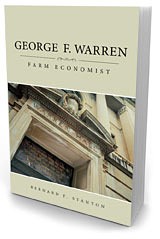New biography by CU professor details George – Warren Hall's namesake and key FDR adviser
By Susan S. Lang
Thousands of Cornell students have streamed through Warren Hall for decades. But how many of them know about its namesake – George F. Warren (1874-1938), a key economic adviser to President Franklin D. Roosevelt and an international leader in developing the field of farm management in the early 20th century – a man so prominent that he graced the cover of Time magazine in 1933?
The new biography, "George F. Warren: Farm Economist" (Cornell University) by Bernard "Bud" F. Stanton '49, Cornell professor emeritus of agricultural economics, details Warren's life and legacy.
Stanton served on the Cornell faculty for 39 years before retiring in 1992. He writes that Warren not only was a revered teacher in the new field of agricultural economics, but that his work influenced state policy on conservation, land use, local government structures, highway improvement, building regional markets and improving rural schools and national economic policy under Roosevelt.
"He was a man apart," said Liberty Hyde Bailey, the first dean of Cornell's College of Agriculture, in memorium. "His department at Cornell broke new ground. ... A few words from him might change the course of a man's thinking. Warren was honest in his opinions to the point of perfect clarity. The people on the land believed in him."
The biography begins with Warren's roots as a farm boy herding sheep on the Nebraska prairie and details his Cornell study with Bailey and his service on the Cornell faculty. Warren chaired the department from 1907 until his death from liver cancer in 1938. Stanton also recounts the success of Warren's first books, "The Elements of Agriculture" and "Farm Management," and his profound influence before World War I on the importance of economics to rural policy, the development of farm management as a field of study and the professional development of agricultural economics.
The book then traces Warren's work as a leader in farm price analysis in the 1920s and '30s, as the agricultural depression of the 1920s became a harbinger of the Great Depression of the early 1930s, and his contributions to helping the United States recover from the Great Depression.
"Warren was nationally known as a strong, vocal advocate of going off the gold standard and moving toward a federally managed currency, which Roosevelt implemented in 1933--34 as an important step in moving the U.S. out of the Depression," says Stanton, adding that Warren's many accomplishments were recognized by Roosevelt, who funded construction of Warren Hall in 1932.
The book is available from the Department of Applied Economics and Management at Cornell for $25 plus $5 for shipping by e-mailing jln4@cornell.edu or calling (607) 255-4576.
Media Contact
Get Cornell news delivered right to your inbox.
Subscribe